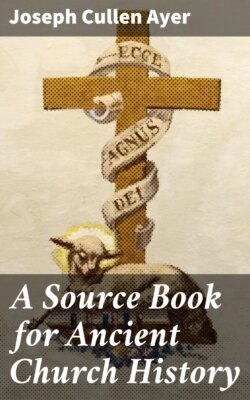Читать книгу A Source Book for Ancient Church History - Joseph Cullen Ayer - Страница 65
На сайте Литреса книга снята с продажи.
(b) Lucian of Samosata, De morte Peregrini Protei, § 11 ff. Preuschen, Analecta, I, 20 ff.
ОглавлениеCh. 11. About this time he made himself proficient in the marvellous wisdom of the Christians by associating around Palestine with their priests and scribes. And would you believe it? In a short time he convinced them that they were mere children and himself alone a prophet, master of ceremonies, head of the synagogue, and everything. He explained and interpreted some of their books, and he himself also wrote [pg 060] many, so they came to look upon him almost as a God, made him their law-giver and chose him as their patron. … At all events, they still worship that enchanter [mage] who was crucified in Palestine for introducing among men this new religious sect.
Ch. 12. Then Proteus was, on this account, seized and thrown into prison, and this very circumstance procured for him during his subsequent career no small renown and the reputation for wonderful powers and the glory which he loved. When, then, he had been put in bonds, the Christians looked upon these things as a misfortune and in their efforts to secure his release did everything in their power. When this proved impracticable, other assistance of every sort was rendered him, not occasionally, but with zeal. From earliest dawn old women, widows, and orphan children were to be seen waiting beside the prison, and men of rank among them slept with him in the prison, having bribed the prison guards. Then they were accustomed to bring in all kinds of viands, and they read their sacred Scriptures together, and the most excellent Peregrinus (for such was still his name) was styled by them a New Socrates.
Ch. 13. Certain came even from the cities of Asia, sent by the Christians at the common charge, to assist and plead for him and comfort him. They exhibit extraordinary activity whenever any such thing occurs affecting their common interest. In short, they are lavish of everything. And what is more, on the pretext of his imprisonment, many contributions of money came from them to Peregrinus at that time, and he made no little income out of it. These poor men have persuaded themselves that they are going to be immortal and live forever; they both despise death and voluntarily devote themselves to it; at least most of them do so. Moreover, their law-giver persuaded them that they were all brethren, and that when once they come out and reject the Greek gods, they should then worship that crucified sophist and live according to his laws. Therefore they despise all things and [pg 061] hold everything in common, having received such ideas from others, without any sufficient basis for their faith. If, then, any impostor or trickster who knows how to manage things came among them, he soon grew rich, imposing on these foolish folk.
Ch. 14. Peregrinus was, however, set at liberty by the governor of Syria at that time, a lover of philosophy, who understood his folly and knew that he would willingly have suffered death that by it he might have acquired glory. Thinking him, however, not worthy of so honorable an end, he let him go. …
Ch. 16. A second time he left his country to wander about, having the Christians as a sufficient source of supplies, and he was cared for by them most ungrudgingly. Thus he was supported for some time; at length, having offended them in some way—he was seen, I believe, eating food forbidden among them—he was reduced to want, and he thought that he would have to demand his property back from the city;32 and having obtained a process in the name of the Emperor, he expected to recover it. But the city sent messengers to him, and nothing was done; but he was to remain where he was, and to this he agreed for once.
